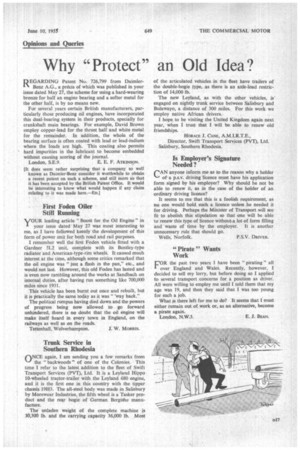Why "Protect" an Old Idea?
Page 83

If you've noticed an error in this article please click here to report it so we can fix it.
REGARDING Patent Nu. 726,799 from DaimlerBenz A.G., a prdcis of which was published in your issue dated May 27, the scheme for using a hard-wearing bronze for half an engine bearing and a softer metal for the other half, is by no means new.
For several years certain British manufacturers, particularly those producing oil engines, have incorporated this dual-bearing system in their products, specially for crankshaft main bearings. For example, David Brown employ copper-lead for the thrust half and white metal for the remainder, In addition, the whole of the bearing surface is often coated with lead or lead-indium where the loads are high. This coating also permits hard impurities in the lubricant to become embedded without causing scoring of the journal.
London, S.E.9. E. E. F. ATK1NS9N.
[IL does seem rather surprising that a company so well known as Daimler-Benz consider it worthwhile to obtain a recent patent on such a scheme, and still more so that it has been accepted by the British Patent Office. It would be interesting to know what would happen if any claim relating to it was made here—ED.] First Foden Oiler Still Running \TOUR leading article "Boost for the Oil Engine" in 1. your issue dated. May 27 was most interesting to me, as I have followed keenly the development of this form of power unit for both road and rail purposes.
I remember well the first Foden vehicle fitted with a Gardner 5L2 unit, complete with its Bentley-type radiator and American-type-rim wheels. It caused much interest at the time, although some critics remarked that the oil engine was "just a flash in the pan," etc., and would not last. However, this old Foden has lasted and is even now rambling around the works at Sandbach on internal duties, after having run something like 700,000 miles since 1931.
This vehicle has been burnt out once and rebuilt, but it is practically the same today as it was" 'way back."
The political rumpus having died down and the powers of progress being now allowed to go forward unhindered, there is no doubt that the oil engine will make itself heard in every town in England, on the railways as well as on the roads.
Tettenhall, Wolverhampton. J. W. Mortals.
Trunk Service hi Southern Rhodesia
nNCE again, I am sending you a few remarks from the " backwoods " of one of the Colonies. This time I refer to the latest addition to the fleet of Swift Transport Services (PVT), Ltd. It is a Leyland Hippo 10-wheeled tractor-trailer with the Leyland 680 engine, and it is the first one in this country with the tipper chassis 19113. The all-steel body was made in Salisbury by Morewear Industries, the fifth wheel is a Tasker product and the rear bogie of German Bergishe manufacture.
The unladen weight of the complete machine is 30,300 lb. and the carrying capacity 36,000 lb. Most of the articulated vehicles in the fleet have trailers of the double-bogie type, as there is an axle-load restriction of 14,000 lb.
The new Leyland, as with the other vehicles, is engaged on nightly trunk service between Salisbury and Bulawayo, a distance of 300 miles. For this work we employ native African drivers., I hope to be visiting the United Kingdom again next year, when I trust that I will be able to renew old friendships.
HORACE J. CANE, A.M.I.R.T.E., Director, Swift Transport Services (PVT), Ltd. Salisbury, Southern Rhodesia.
Is Employer's Signature Needed ?
(-AN anyone inform me as to the reason why a holder • —•' of-a p.s.v. driving licence must have his application form signed by his employer? Why should he not be able to renew it, as in the case of the holder of an ordinary driving licence?
It seems to me that this is a foolish requirement, as no one would hold such a licence unless he needed it for driving.. Perhaps the Minister of Transport will see fit to abolish this stipulation so that one will be able to renew this type of licence without-a lot of form filling and waste of time by the employer. It is another unnecessary rule that should go.
Wells, Norfolk. P.S.V. DRIVER.
" Pirate " Wants Work
pOR the past two years 1 have been " pirating " all over England and Wales. Recently, however, I decided to sell my lorry, but before doing so I applied to several transport concerns for a position as driver. All were willing to employ me until I told them that my age was 19, and then they said that I was too young for such a job.
What is there left for me to do? It seems that I must either remain out of work or, as an alternative, become a pirate again.
London, N.W.3. E. J. BEAN.




























































































































































